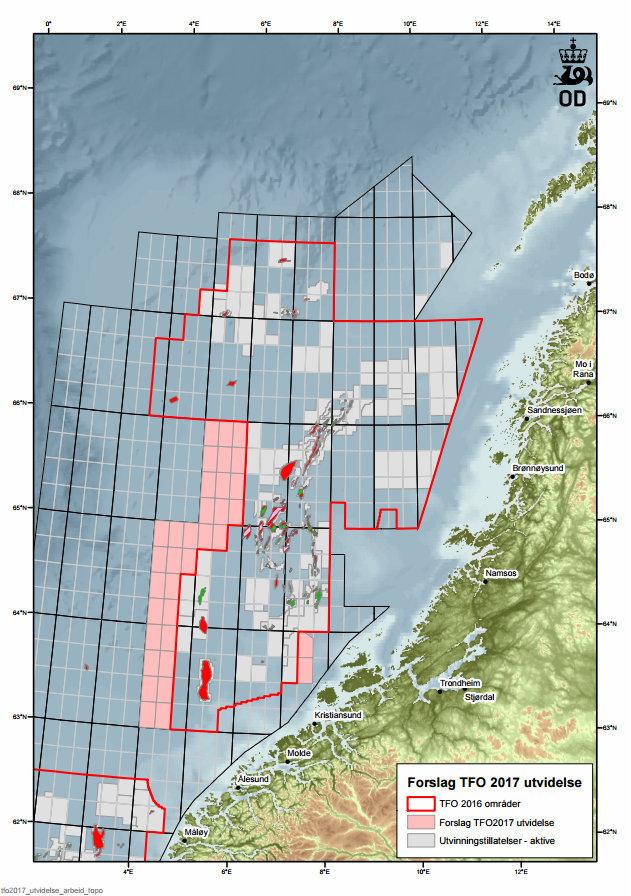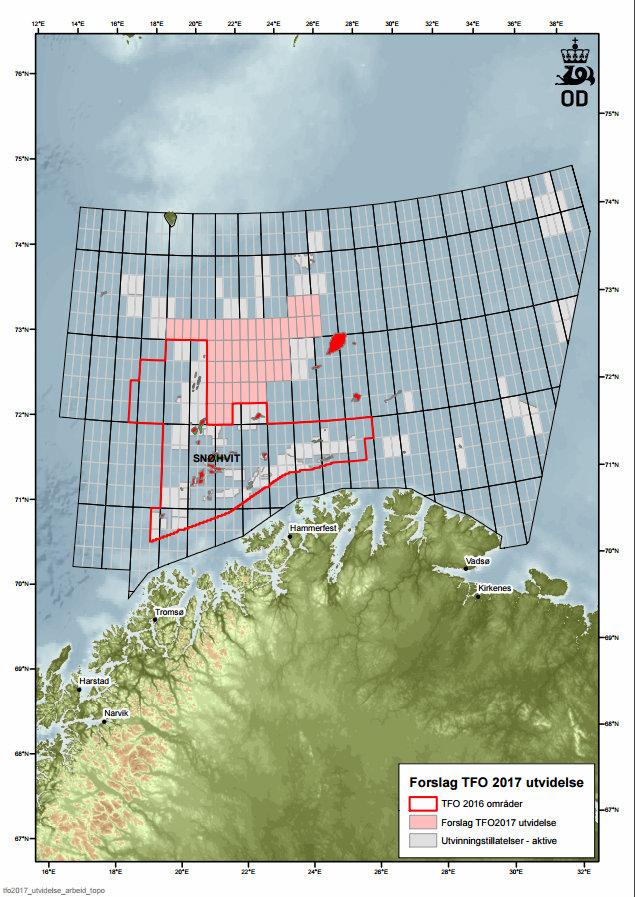Norwegian government facilitates further oil exploration

On Tuesday 13 December, the Norwegian Oil and Energy Department started the 2017 TFO allocation process.
On Tuesday 13 December, the Norwegian Oil and Energy Department started the 2017 TFO allocation process.
A public hearing constitutes the first part of the process, and the documents were made available yesterday. The hearing deadline is 31 January. A TFO allocation, or an allocation in pre-defined areas, is one out of two possible and equal license allocation rounds on the Norwegian continental shelf. In a TFO allocation, licenses to exploit are awarded for the geologically best explored parts of the shelf.
- The allocation of a prospective search area is a cornerstone of the government’s petroleum policy and a crucial tool in its resource management. TFO 2017 will contribute to activities and further creation of value in our ocean areas, says Oil and Energy Minister Tord Lien of the Progress Party.
Significant in the Barents Sea
TFO allocations are awarded annually and cover all mature areas on the Norwegian shelf. The suggestions for next year’s allocation means that the TFO area of the Barents Sea is significantly expanded.
- Through this expansion we facilitate an overall development of the Barents Sea as a petroleum province. That is vital for the creation of values, growth and employment, in particular in Northern Norway, says Lien.
The suggested areas of next year’s TFO round are mature areas situated near planned or existing infrastructure.
There are no suggested TFO blocks in the North Sea during next year’s allocation round. 34 blocks are suggested allocated in the Norwegian Sea, whereas the number for the Barents Sea is 53. (See overview maps at the bottom of this article.)
Wants to cancel the TFO system
The NGO Friends of the Earth Norway is furious about the proposal. The NGO’s leader Silje Ask Lundberg argues that the whole allocation round must be halted and that the TFO procedure as a whole must be cancelled. The NGO argues that the TFO allocation system undermines the whole system for an overall sea environment management system, and prevents necessary environmental initiatives in the oil industry.
- The whole allocation must be stopped and the TFO procedure cancelled, says Silje Ask Lundberg, head of Friends of the Earth Norway. She points to the fact that when an area has been allocated through the TFO procedure, there is no way back. There are no mechanisms in place to change the status of an area once allocated, regardless of new knowledge available, such as environmental or climate knowledge. There is no real opportunity for withdrawing such an allocation.
Have warned against these areas
- The announcement is a dramatic extension of the search areas on the Norwegian shelf and way exceeds the definition of a mature area. In the Barents Sea today there is just one oil platform, yet Minister Tord Lien tries to define nearly half the Barents Sea as a mature area, so that he can seal exploration licenses for the foreseeable future, says Lundberg. She is in particular concerned about the fact that that several of the areas now proposed opened are in areas where the Norwegian Environment Agency has previously warned against exploration.
- This government keeps setting new records in ignoring advice from its own agencies. Not only does it propose opening areas further north, which the Norwegian Energy Agency has warned against, it also suggests opening particular blocks off the Møre coast that are situated right next to one of the most crucial areas for the fish industry. That is way over the top, Lundberg says.
Contributes to employment and growth
The industry’s NGO Norwegian Oil and Gas are not surprisingly far more positive towards the news. Managing Director Karl Eirik Schjøtt-Pedersen claims that the TFO allocations contribute to the Norwegian shelf continuing being attractive and competitive, which is vital for upholding employment and growth.
Schjøtt-Pedersen supports the proposed areas in the Barents Sea:
- The Norwegian Petroleum Directorate and several of the oil companies have stated that they hold positive expectations regarding the potential of the Barents Sea, which is why we appreciate the Oil and Energy Department’s opening these up for further exploration, he says.
Read this article in Norwegian here.

Proposed TFO blocks in the Norwegian Sea marked with pink. (Map: The Norwegian Petroleum Directorate)

Proposed TFO blocks in the Barents Sea marked in pink. (Map: The Norwegian Petroleum Directorate.)
